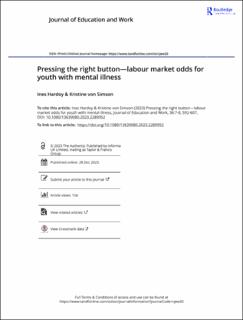Pressing the right button—labour market odds for youth with mental illness
Peer reviewed, Journal article
Published version
Permanent lenke
https://hdl.handle.net/11250/3112407Utgivelsesdato
2023Metadata
Vis full innførselSamlinger
- Publikasjoner fra CRIStin [716]
- Tidsskriftpublikasjon [389]
Sammendrag
Mental disorders threaten the chances of finishing secondary school and can hinder the school-to-work transitions of afflicted youths. Earlier onset depression predicts the chronicity, recurrence, and severity of episodes throughout life. Using rich, objective mental health data and a battery of variables covering personal and family characteristics, we investigate the impact of Norway’s vocational rehabilitation programmes on youths aged 18–23 who are registered as unemployed. Our results indicate that the impact vary with mental health in adolescence, a variable often unavailable in such analyses. Separate analyses for age group 19–21 and 20–23 show that the younger ones with previous diagnosed mental disorders were likely to pursue further education after participating in programmes providing work practice; those with no earlier diagnosed mental disorders were prone to pursue ordinary education after completing a training programme. For the older age cohorts, aged 20–23, vocational rehabilitation programmes seem counterproductive, irrespective of programme type and of whether they were diagnosed with mental health problems in adolescence or not. Pressing the right button—labour market odds for youth with mental illness
